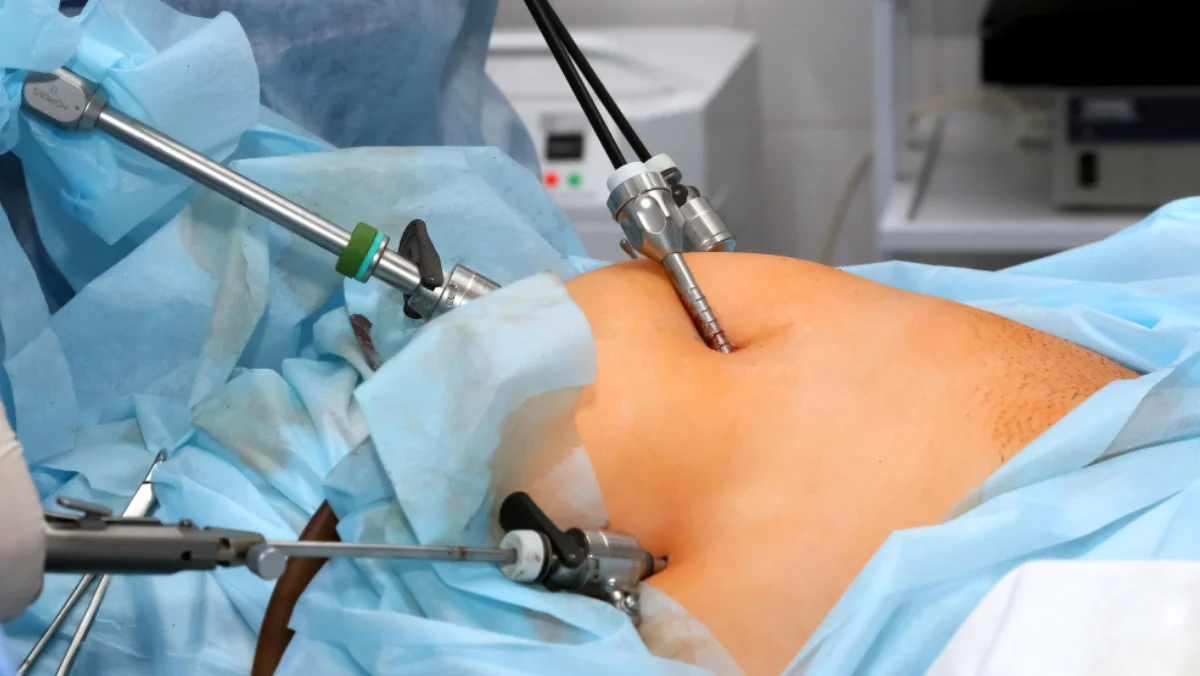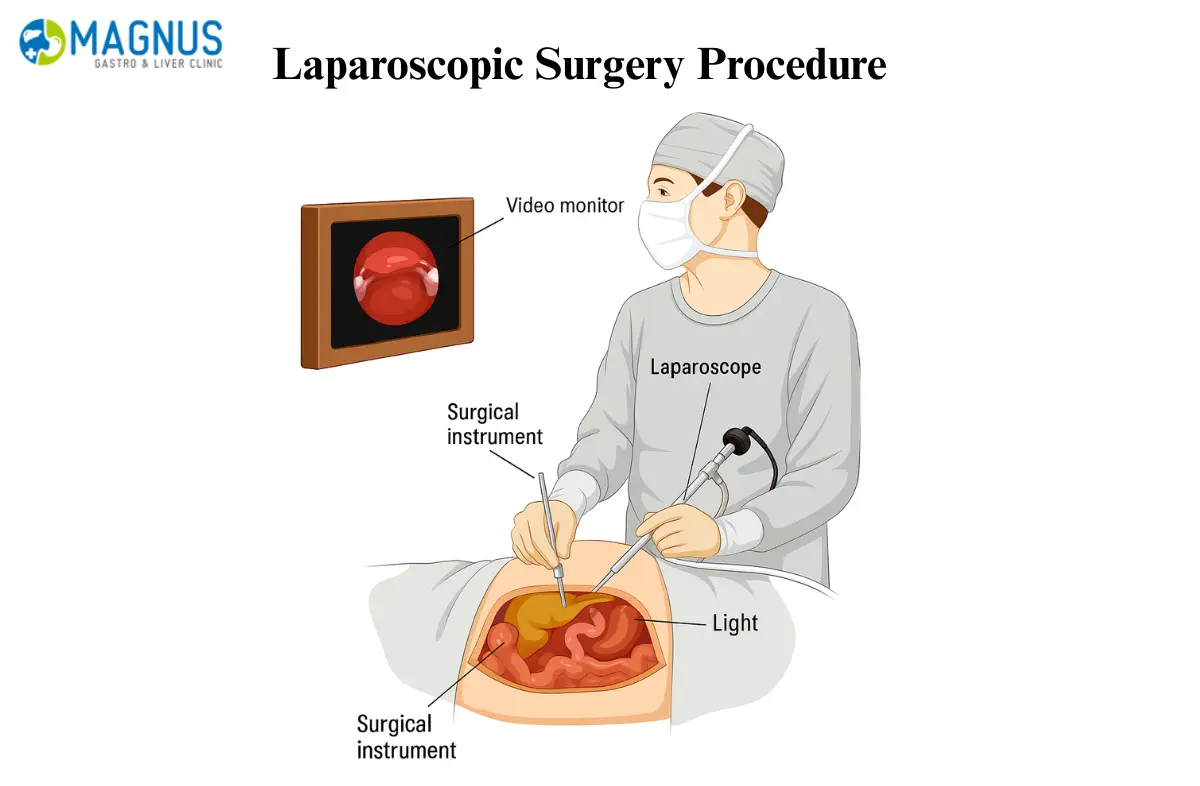Laparoscopic Surgery

Looking for expert laparoscopic surgery in Chennai? Discover advanced and minimally invasive surgical options with skilled surgeons in Chennai. Are you considering undergoing laparoscopic surgery in Chennai? If so, you are likely wondering what to expect before, during, and after the procedure. At Magnus Gastro & Liver Clinic in Chennai, we provide comprehensive and quality care when it comes to our patients. We ensure to perform the right procedure that is best for our patients and helps them for a faster recovery without any risk or side effects.
What is laparoscopic surgery?
Laparoscopic Surgery Vs Open Surgery
| Laparoscopic Surgery | Open Surgery |
| Small incisions, typically ¼ to ½ inch each. | Larger incision, usually between 8-10 inches. |
| Reduced recovery time post-operation. | Longer and more complex post-operative recovery. |
| Shorter hospitalization is required. | Extended hospital stays. |
| Lower need for narcotics and post-surgery medications. | Increased requirement for narcotics and other recovery medications. |
| Fewer wound complications and risks of infection. | Higher incidence of wound complications, including infections. |
| Minimal bleeding, often eliminating the need for blood transfusions. | Greater risk of excessive bleeding and a potential need for blood transfusions. |
| Reduced exposure of internal organs to potential external contaminants, decreasing infection risks. | Increased exposure of internal organs to external contaminants, raising infection risks. |
Types of Laparoscopy
Laparoscopy encompasses various types tailored to diagnose and treat different medical conditions using minimally invasive techniques. Laparoscopic surgery in Chennai offers patients access to these advanced procedures, combining precision with reduced recovery times and less postoperative discomfort. The cost of laparoscopic surgery in Chennai depends on the type of laparoscopy performed, hospital facilities, and Laparoscopic Surgeon expertise, making it essential for patients to understand the options available.
- Diagnostic Laparoscopy: This procedure involves inserting a laparoscope to visually inspect the abdominal or pelvic organs to identify causes of pain, infertility, or tumors. It provides a minimally invasive way to gather tissue samples or perform biopsies, often serving as a precursor to therapeutic surgery.
- Operative Laparoscopy: Beyond diagnosis, operative laparoscopy allows surgeons to perform interventions such as removing cysts, tumors, or diseased tissues. It is commonly used in gynecological, gastrointestinal, and oncological surgeries, offering benefits like smaller scars and faster healing.
- Laparoscopic Cholecystectomy: One of the most common types, this procedure removes the gallbladder to treat gallstones or infections. Its widespread availability in Chennai makes it a preferred option due to its shorter hospital stays and lower risk of complications.
- Laparoscopic Hernia Repair: This surgery repairs hernias by reinforcing the weakened abdominal wall using mesh implants inserted through small incisions. Patients experience less postoperative pain and quicker return to daily activities compared to open surgery.
- Laparoscopic Colectomy: This involves removing part of the colon affected by cancer, diverticulitis, or inflammatory bowel disease. The minimally invasive approach reduces blood loss and postoperative infections, positively impacting recovery duration and overall outcomes.
Procedure of Laparoscopy
Laparoscopy is a minimally invasive surgical technique that involves small incisions and the use of a camera to perform diagnostic or therapeutic procedures. Laparoscopic surgery in Chennai is performed in many advanced medical centers, combining skilled surgeons and modern technology to ensure patient safety and effective outcomes. The laparoscopic surgery cost in Chennai varies depending on the complexity of the procedure, hospital infrastructure, and surgeon experience, offering patients a cost-effective alternative to open surgery.
- Inserting the Laparoscope and Instruments: The laparoscope, equipped with a camera and light, transmits live images to a screen, allowing the surgeon to navigate precisely. Other surgical instruments are inserted through additional ports to perform the necessary surgical tasks.
- Performing the Surgery: Depending on the indication, the surgeon may remove tissue, repair organs, or take biopsies using the laparoscopic instruments. This approach allows for precise interventions while minimizing damage to surrounding structures. How to Remove Gallbladder Stones is commonly addressed through laparoscopic cholecystectomy, where the gallbladder is removed safely through small incisions.
- Completion and Closure: After the procedure, instruments are carefully withdrawn, and the carbon dioxide gas is released from the abdomen. The small incisions are then closed with sutures or surgical adhesive, promoting faster healing.
- Postoperative Care: Patients are monitored in recovery rooms before being discharged, often within 24 to 48 hours. The minimally invasive nature of laparoscopic surgery in Chennai contributes to shorter hospital stays and quicker returns to normal activities.
Diagnosis
- Comprehensive Medical Evaluation: Diagnosis for laparoscopic surgery in Chennai begins with a thorough medical evaluation, including the patient’s medical history, current symptoms, and prior surgical experiences. This helps surgeons determine if laparoscopy is the safest and most effective approach.
- Imaging Tests: Advanced imaging techniques, such as ultrasound, CT scans, or MRI, are commonly used to identify internal issues. These images allow surgeons to locate the exact area requiring intervention and plan the laparoscopic procedure accurately.
- Blood Tests and Laboratory Analysis: Routine blood work and lab tests are essential to check for infections, clotting disorders, or any underlying conditions that could complicate surgery. Results help ensure patient safety and guide preoperative preparations.
- Physical Examination: Surgeons perform a careful physical examination to assess the patient’s abdominal condition and identify potential complications. This step often determines the size, number, and placement of laparoscopic incisions.
- Specialist Consultation: A detailed consultation with a laparoscopic surgery specialist helps explain the procedure, risks, and recovery expectations. It ensures that the patient fully understands the necessity and benefits of laparoscopy in Chennai, making informed decisions about treatment.

Benefits of Laparoscopic Surgery
- Minimally Invasive Procedure: Laparoscopy in Chennai offers minimally invasive surgery, requiring small incisions instead of large cuts. This reduces tissue damage, scarring, and postoperative pain, promoting faster healing.
- Shorter Recovery Time: Patients undergoing laparoscopic surgery often experience quicker recovery compared to traditional open surgery. Early resumption of daily activities is possible, enhancing convenience and comfort.
- Lower Risk of Infection: Smaller incisions lower the chances of infection, reducing hospital stays and complications. This benefit makes laparoscopy in Chennai a preferred option for many patients.
- Precision and Accuracy: Advanced laparoscopic instruments allow surgeons to perform procedures with high precision. Enhanced visualization of organs ensures accurate treatment, improving overall surgical outcomes.
- Reduced Blood Loss: Laparoscopic techniques minimize intraoperative blood loss, decreasing the need for transfusions. This benefit contributes to faster recovery and lower risk during surgery, making it a safer choice.
Treatments Offered
- Gallbladder Surgery (Cholecystectomy): Laparoscopic gallbladder removal treats gallstones, inflammation, and biliary disorders. Patients benefit from minimal pain, shorter hospital stays, and rapid recovery.
- Hernia Repair: Laparoscopic surgery effectively addresses various hernias, including inguinal, umbilical, and hiatal hernias. The procedure ensures reduced postoperative discomfort and lower recurrence rates.
- Appendectomy: Laparoscopic removal of the appendix provides a safer, faster alternative to open surgery. It minimizes complications, ensures smaller scars, and allows patients to resume normal activities sooner.
- Gynecological Procedures: Laparoscopic surgery in Chennai is widely used for hysterectomy, endometriosis treatment, and ovarian cyst removal. These procedures are less invasive, resulting in quicker healing and minimal tissue damage.
- Bariatric Surgery: Weight-loss surgeries like gastric bypass or sleeve gastrectomy are performed laparoscopically to reduce complications and enhance recovery. Patients experience improved post-surgical outcomes with shorter hospital stays.
Factors Affecting the Cost of Laparoscopic Surgery in Chennai
- Type of Procedure: The complexity and type of laparoscopic surgery significantly influence the laparoscopic surgery cost in Chennai. Procedures like gallbladder removal or hernia repair generally have lower costs compared to advanced surgeries like bariatric or liver laparoscopy.
- Hospital Facilities: Hospitals with state-of-the-art equipment, advanced operation theatres, and experienced surgeons may have higher charges. The cost of laparoscopic surgery in Chennai often reflects the quality of infrastructure and medical support provided.
- Surgeon’s Experience: Surgeons with extensive expertise and specialization in laparoscopy typically charge higher fees. Patients seeking the best laparoscopic surgery in Chennai often consider this factor alongside hospital reputation.
- Preoperative and Postoperative Care: The cost may include diagnostic tests, anesthesia, medications, and follow-up care. Comprehensive pre- and post-surgery support enhances patient safety but can increase overall expenses.
- Geographical Location: Hospitals in metropolitan areas or prime city locations usually have higher service costs. Laparoscopic surgery in Chennai may vary depending on the hospital’s locality, amenities, and accessibility.
Conclusion
Laparoscopic Surgery in Chennai has become a preferred choice for patients seeking advanced, minimally invasive solutions for various medical conditions. With its reduced recovery time, minimal scarring, and expert surgical care, Chennai offers world-class facilities and highly skilled surgeons. Whether you’re exploring the laparoscopic surgery cost in Chennai or preparing for the procedure, the city provides accessible and affordable healthcare tailored to your needs. Take the first step toward a healthier tomorrow with trusted laparoscopy in Chennai options.
Frequently Asked Questions
No, LASER (Light Amplification by Stimulated Emission of Radiation) and laparoscopy are not the same things. They are two different medical procedures with distinct purposes. Laparoscopy is a minimally invasive surgical technique that involves making small incisions in the abdomen to insert a laparoscope—a long, thin tube with a camera and light source attached—to visualize the internal organs. The laparoscope allows surgeons to see inside the abdomen and perform various procedures, such as removing organs, taking biopsies, or repairing tissues. Laparoscopy is commonly used in gynecology, urology, general surgery, and other medical specialties.
Laparoscopy is typically performed under general anesthesia, which means that the patient is completely unconscious during the procedure. This allows for pain management and ensures that the patient remains still and comfortable throughout the surgery. However, in some cases, laparoscopy can be performed under local anesthesia with sedation. Local anesthesia involves injecting medication to numb a specific area of the body, but the patient remains awake. Sedation, often administered through an intravenous (IV) line, helps to keep the patient relaxed and comfortable during the procedure.
After laparoscopic surgery, it is important to follow a proper diet to promote healing, prevent complications, and aid in a smooth recovery. While specific dietary recommendations may vary depending on the type of surgery and individual circumstances, here are some general guidelines to consider:
- Clear Liquids
- Full Liquids
- Soft Foods
- Fiber-Rich Foods
- Adequate Protein
- Hydration
- Small, Frequent Meals
- Avoid Problematic
- Food
Laparoscopic surgery is generally less painful than open surgery due to its small incisions. Most patients experience mild discomfort, such as soreness or bloating, which usually subsides within a few days. Pain is minimal and manageable with medication. Recovery is quicker, and patients often return to normal activities sooner compared to traditional surgical method.
